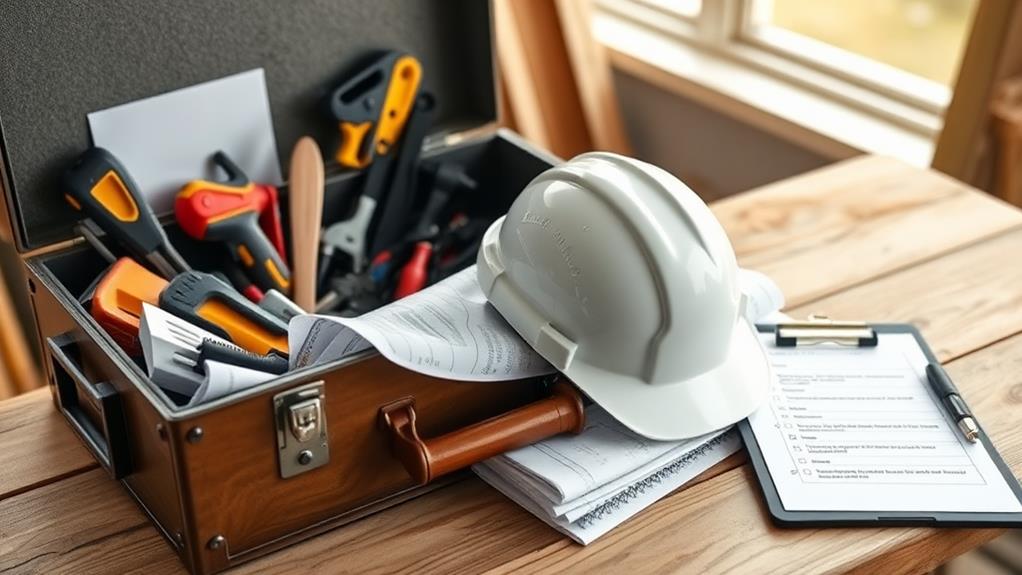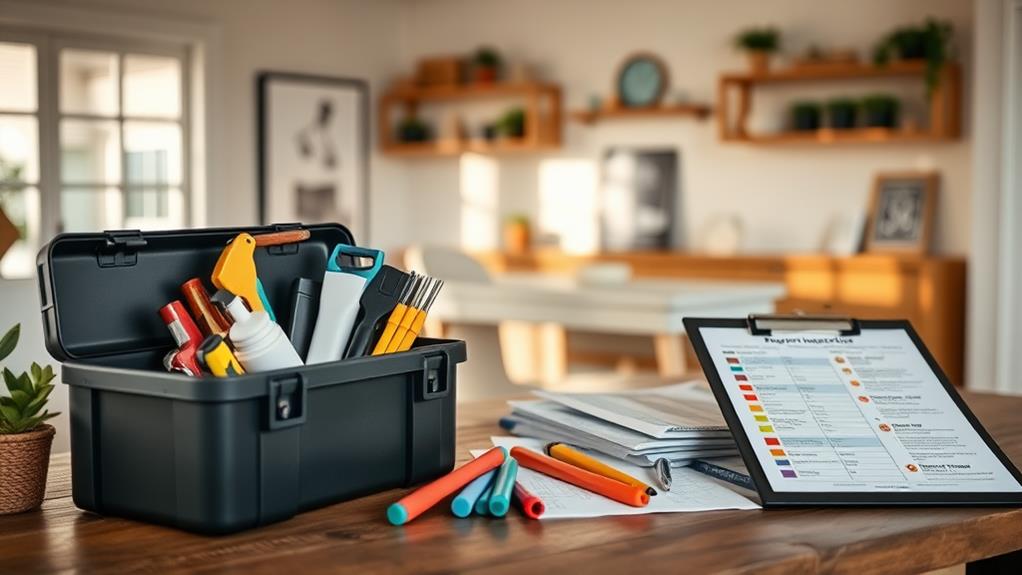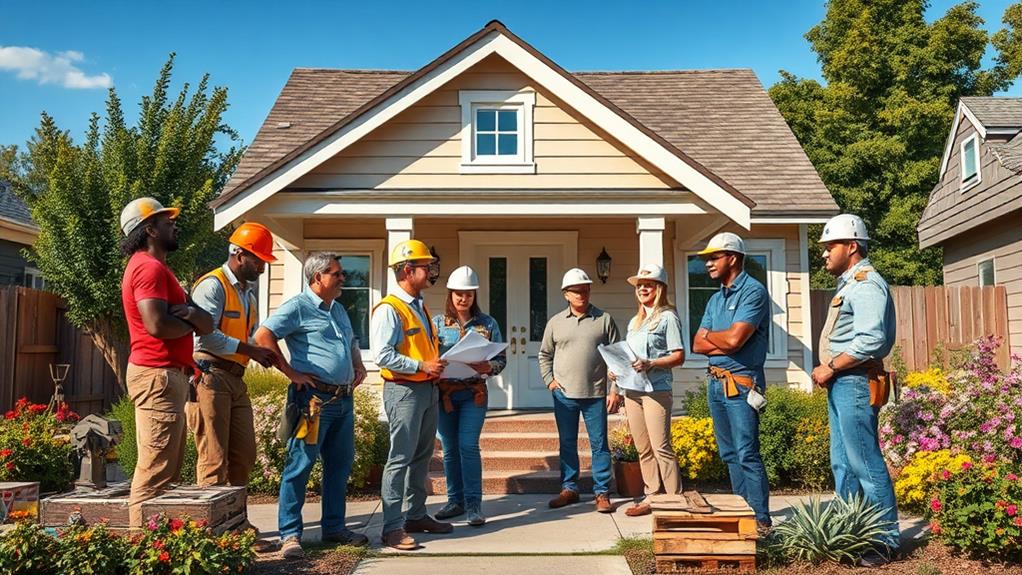When choosing local home contractors, start by checking their licensing and insurance to protect yourself. Look for experienced professionals with good references. Communication is key, so make certain they listen and provide clear estimates. Be cautious of unusually low bids, as they may signal quality issues. Review the contract carefully; make sure it includes a detailed scope of work and a clear payment schedule. After the project, inquire about warranties and support. Finally, keep track of all your communications for future reference. These steps will help you find a contractor who meets your needs and expectations. You’ll discover more useful tips ahead.
What to Look for in a Contractor

When hiring a contractor, it’s vital to know what to look for to guarantee your project runs smoothly. First, make sure the contractor is licensed and insured. This protects you from any legal issues or financial liabilities that could arise during the project.
Next, seek a contractor with significant experience in the industry. Experienced contractors often have the expertise and valuable connections needed to complete your project efficiently.
It’s also essential to request and verify references from previous clients. This gives you insights into the contractor’s work quality and communication style.
Pay attention to their professionalism during your initial interactions. Notice their punctuality, clarity in communication, and thoroughness in proposals, as these traits reflect their commitment to your project.
Finding Local Contractors
Finding the right local contractor can feel overwhelming, but a few effective strategies can simplify the process.
Start by contacting local builders associations, like the Greater Houston Builders Association, which can provide a list of vetted contractors. This way, you’ll find professionals committed to quality and customer satisfaction.
Next, explore online directories such as Angie’s List, Houzz, and Yelp. These platforms let you filter contractors based on reviews and ratings, helping you identify a good contractor who meets your needs.
Community recommendations also play a crucial role; check out social media groups on Facebook or neighborhood apps like Nextdoor to hear from locals who’ve hired contractors before.
Word of mouth is powerful, so don’t hesitate to ask friends, family, and neighbors for referrals. Their personal experiences can give you trustworthy insights into a contractor’s quality of work and reliability.
Finally, attending local events like home improvement shows allows you to meet contractors face-to-face, helping you gauge their professionalism and commitment.
Vetting Potential Candidates

Vetting potential contractors is a significant step in ensuring your home project goes smoothly. Start by requesting initial consultations with various home builders to gauge their expertise and see if they truly understand your needs.
It’s important to have clear communication, as this can set the tone for your entire project.
Next, obtain itemized estimates from multiple contractors. This helps you compare costs, materials, and timelines, allowing you to make an informed decision.
Always verify each contractor’s licensing and insurance coverage. This is essential for legal compliance and protects you from potential liabilities.
Additionally, take the time to read a mix of reviews and testimonials from past clients. This gives you a balanced perspective on the contractor’s work quality and customer service.
Don’t hesitate to ask for references and check them as well. Evaluating potential candidates based on their previous work can reveal their reliability and client satisfaction levels.
Understanding Contract Details
Understanding the details of your contract is essential to guaranteeing a successful home project. A thorough contract should clearly outline the scope of work, detailing the exact tasks, materials, and finishes to avoid any confusion later on. This clarity helps you know exactly what to expect from your contractor.
The payment schedule in your contract is equally important. It should include a structured plan, typically starting with an initial deposit and followed by payments tied to specific project milestones. This way, you can guarantee that payments are made only when work is satisfactorily completed.
Don’t forget to include clauses for change orders in the contract. These clauses explain how any adjustments to the project will be handled, preventing disputes down the line.
Additionally, guarantees and warranties for both workmanship and materials should be explicitly stated, holding the contractor accountable for quality.
Negotiating Payment Terms

Once you’ve clarified the details in your contract, it’s time to focus on negotiating payment terms that work for both you and your contractor.
Establishing a structured payment schedule is essential. You might want to tie payments to specific project milestones. This guarantees both parties are aligned on expectations throughout the project’s duration.
Avoid making large upfront payments. Instead, consider a common practice like paying 10% upon signing, followed by staggered payments of 25% at intervals, and the final 15% when the project is completed.
Make certain to include lien release clauses in your contract. This protects you against potential claims from subcontractors or suppliers if your contractor fails to make payments.
It’s also important to clearly outline terms for change orders and unexpected costs in the contract. This way, you can prevent disputes and maintain transparency regarding any financial adjustments.
Red Flags to Avoid
When choosing a contractor, watch out for unusually low bids that can signal poor quality or hidden costs down the line.
If you find it hard to reach the contractor, that could mean trouble with communication during the project.
These red flags are important to take into account, as they can save you from potential headaches later on.
Unusually Low Bids
Maneuvering the world of home contracting can be tricky, especially when you encounter unusually low bids that seem too good to be true. While it might be tempting to choose the lowest offer, these bids often signal potential issues. A contractor offering a notably cheaper price may cut corners on quality, using inferior materials or substandard labor. This can lead to costly repairs down the line.
Additionally, low bids can indicate hidden costs. Some contractors may underbid to secure a job, only to raise prices later through change orders. It’s essential to look out for this, as those extra expenses can quickly add up.
Moreover, contractors with unusually low bids might lack proper licenses or liability insurance, leaving you vulnerable in case of accidents or legal issues during the project.
To make an informed decision, always conduct a thorough comparison of bids. Confirm that you’re looking at equivalent scopes of work, materials, and timelines. By doing this, you’ll gain a clearer understanding of the true costs involved and avoid pitfalls that could derail your home improvement plans.
Poor Communication Patterns
How can you tell if a contractor’s communication style is a warning sign? If you find it difficult to reach a contractor or notice delayed responses to your inquiries, it might indicate poor communication and a lack of organization. This could lead to bigger issues down the road.
You should also pay attention to how well they keep you updated on project timelines and progress. If they’re not providing clear, timely updates, it can create confusion and frustration.
Another red flag is if a contractor is hesitant to put agreements in writing or avoids discussing project specifics in detail. This reluctance raises concerns about transparency and accountability. You want a contractor who prioritizes effective communication skills and customer service.
Additionally, be wary of pushy sales tactics or overly aggressive communication styles; they often suggest a focus on closing the deal rather than your needs or project quality.
Checking References and Reviews

When you’re choosing a contractor, checking references and reviews is key to making an informed decision.
Make sure to ask for a list of past clients and follow up with them to hear about their experiences, as this can give you insight into the contractor’s reliability and communication style.
Additionally, browsing online reviews can help you spot patterns, both good and bad, that might influence your choice.
Importance of References
Checking references is essential for anyone hiring local home contractors, as it provides valuable insights into their reliability and workmanship.
When you reach out to previous clients, you can learn about their satisfaction with the contractor’s quality of work and how well they met deadlines. Satisfied clients often share detailed experiences, which can help you gauge the contractor’s performance.
It’s wise to ask specific questions about communication and how the contractor handled potential issues during the project. This direct engagement allows you to evaluate whether the contractor is a good fit for your needs.
Additionally, seek references from projects similar in scope and design to yours. This way, you can assess their expertise in managing specific challenges related to your renovation or construction.
Analyzing Online Feedback
Analyzing online feedback is essential for making an informed decision about local home contractors. Start by checking online reviews on platforms like Angie’s List, Houzz, and Google. A contractor with an average rating of 4 stars usually indicates reliability and good customer service.
Make sure to read both positive and negative reviews to get a balanced view. Statistics show that 68% of consumers trust reviews more when they see a mix of feedback.
When checking references, ask for at least three recent clients. Inquire about their overall satisfaction, communication, and how timely the project was completed. This helps you assess the contractor’s reliability.
Pay attention to how contractors respond to negative reviews, too. A professional response shows they’re willing to address concerns and improve.
Don’t forget about personal recommendations! Utilize social media platforms and community groups to gather informal feedback. Often, insights from neighbors or friends can provide context and trustworthiness that anonymous online reviews can’t match.
Communicating With Past Clients
How can you guarantee that a contractor is the right fit for your project? One of the best ways is by communicating with past clients. Start by asking them about their overall satisfaction with the contractor’s work. Did the project finish on time and within budget? These details are essential for understanding how the contractor operates.
Inquire specifically about the quality craftsmanship and materials used. It’s important to know if they followed the project scope and specifications.
Pay attention to comments on the contractor’s communication skills, too. Were they responsive and clear throughout the process? Good communication can make a big difference in how smoothly the project runs.
Look for patterns in the feedback you gather. Are there any recurring themes, such as timeliness, professionalism, or attention to detail? This can give you insight into what you can expect.
Utilizing online platforms like Angie’s List or Houzz can help you read a broader range of reviews and verify the contractor’s reputation in your community.
Importance of Communication
Effective communication is essential when working with home contractors, as it lays the foundation for a successful project. When you establish a communication plan at the start, you set clear expectations regarding how often you’ll receive updates and the preferred methods of contact. This helps both you and the contractor stay accountable throughout the project.
Open lines of communication are vital; they allow you to express any concerns or adjustments as the work progresses. Research shows that projects with consistent communication are 30% more likely to finish on time and within budget. This means that when you maintain regular updates, you create a more collaborative environment, leading to higher satisfaction and better outcomes for everyone involved.
Additionally, it’s important to document communication, including any decisions and changes made along the way. This serves as a valuable reference point, helping to prevent future disputes and ensuring that all parties remain on the same page.
Ultimately, choosing a reputable business with strong communication practices can greatly enhance your home renovation experience, making it smoother and more enjoyable.
Ensuring Quality Assurance

Once you’ve established clear communication with your contractor, the next step is to focus on quality assurance.
Start by evaluating the contractor’s reputation. Check their history of completed projects and any awards they’ve received; this can give you insight into their craftsmanship and attention to detail.
It’s also vital to verify that the builders adhere to local building codes and regulations. This guarantees compliance and safety throughout the construction process.
Next, review client testimonials and online reviews to gauge satisfaction levels. These resources can reveal the consistency of the contractor’s work quality.
Don’t forget to inquire about the materials used in construction. A contractor’s commitment to high-quality materials can greatly impact both the durability and aesthetics of your project.
Post-Project Support and Follow-Up
After your project wraps up, it’s essential to understand the post-project support your contractor offers.
Make sure to ask about their warranty and any ongoing maintenance services, so you know what to expect if issues arise later.
Establishing clear communication for follow-ups will help you stay informed and address any concerns efficiently.
Ongoing Maintenance Services
When it comes to maintaining your home, ongoing maintenance services play an essential role in guaranteeing your investment remains in top shape. These services often include regular inspections and upkeep of structures, helping to ensure that everything stays compliant with safety codes.
Many reputable contractors offer warranty packages that cover repairs and maintenance for a specified period after project completion, giving you peace of mind. For example, reliable services like Pressure Washing Los Angeles guarantee that your property’s exterior remains clean and well-maintained.
Scheduled follow-up visits by contractors can identify potential issues before they escalate, saving you from costly repairs down the line. Some contractors even provide maintenance plans that offer discounted rates for ongoing services, promoting long-term relationships with clients like you. This not only helps in maintaining your home but also fosters trust and reliability.
Effective post-project support includes clear communication channels, allowing you to report issues or request services easily. When you can communicate directly with your contractor, it enhances customer satisfaction and guarantees that your concerns are addressed promptly.
Warranty and Guarantees
A solid warranty and guarantee can make all the difference in your home improvement project. When choosing a contractor, always request a written warranty that clearly outlines the scope of coverage, duration, and specific conditions for service after project completion. Most reputable contractors offer warranties ranging from one to ten years, covering defects in workmanship and materials. This guarantees you receive long-term quality assurance.
Be sure to verify if the warranty includes follow-up support or maintenance services. This can greatly impact the longevity and performance of the work done. Understanding the specifics of what the warranty covers is essential. Pay attention to any exclusions to avoid unexpected costs in the future.
It’s also important to keep a record of all warranties and guarantees provided. Make sure to include contact information for follow-up support, so you can easily access post-project assistance when needed. Having this information can save you time and stress later on.
Communication After Completion
Effective communication is essential for guaranteeing a smooth shift from your home improvement project to post-completion support. Post-project support can make a big difference in your experience as a homeowner. Many homeowners find it helpful to communicate with contractors for maintenance tips and warranty claims after the work is done.
A reputable contractor should provide a clear follow-up process, including scheduled check-ins to guarantee client satisfaction and address any issues that may arise.
During the contractor selection process, don’t hesitate to ask about their post-project support policies. Find out their response times for inquiries and availability for follow-up consultations.
Keeping records of all communications post-completion can also help you discuss any warranty or repair needs effectively. Establishing a good relationship with your contractor during the project can pave the way for more effective communication and support later on.
This trust can be beneficial for future projects or referrals. By prioritizing communication after completion, you’ll feel more confident in your contractor’s support and your home’s ongoing maintenance needs, guaranteeing everything remains in top shape.
Conclusion
In the end, choosing the right local home contractor isn’t as simple as picking a name from a hat, though that might seem easier. By carefully considering what to look for, vetting candidates, and checking references, you’re setting yourself up for success. Don’t forget about communication and post-project support, either. With these tips in mind, you’ll not only find a skilled contractor but also avoid turning your dream project into a nightmare. Happy renovating!


Leave a Reply